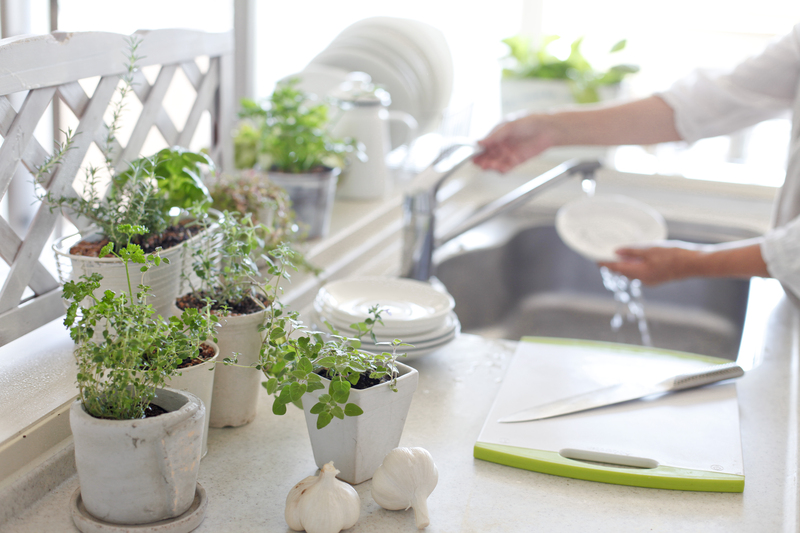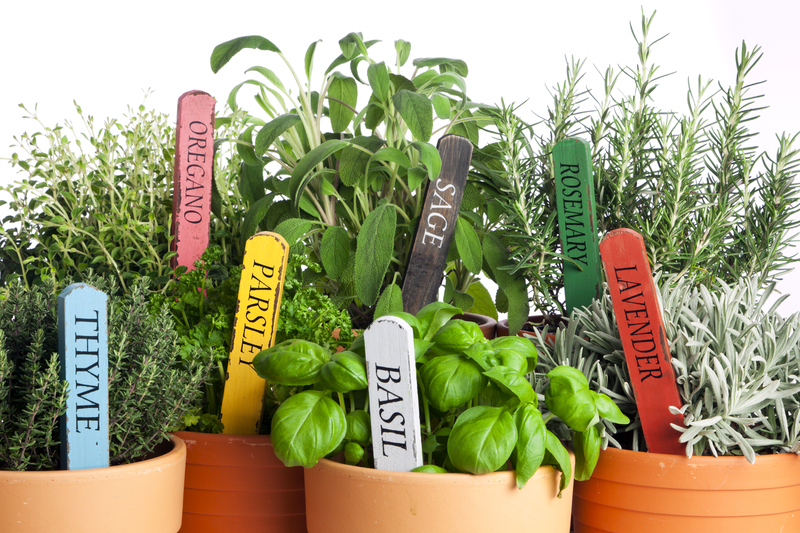From Seeds to Sprouts: Nurture a Robust Herb Garden
Posted on 25/09/2025
From Seeds to Sprouts: Nurture a Robust Herb Garden
Imagine plucking fresh basil for your homemade pasta, or snipping fragrant rosemary for your roasted potatoes--all from your very own herb garden. Cultivating herbs from seeds to sprouts is a rewarding and sustainable journey. With the right techniques and knowledge, even novice gardeners can nurture a robust herb garden that thrives year-round. In this comprehensive guide, we'll walk you through every step, from choosing seeds to harvesting aromatic leaves, ensuring your experience is both successful and satisfying.
Why Grow Herbs at Home?
- Freshness and Flavor: Homegrown herbs deliver unbeatable aroma and taste.
- Cost-Effective: Growing herbs from seed is highly economical compared to store-bought bunches.
- Convenience: Enjoy easy access to culinary herbs just steps from your kitchen.
- Healthier Options: You control the growing process, ensuring pesticide-free harvests.
- Therapeutic Benefits: Gardening offers stress relief and a sense of accomplishment.

Getting Started: Choosing Your Herb Garden Seeds
The foundation of a thriving herb garden is selecting the right herbs to grow. Consider these factors:
- Culinary Preferences: Think about the herbs you use most, such as basil, parsley, mint, or thyme.
- Growing Conditions: Some herbs prefer sun, while others tolerate partial shade. Match your choices to your available garden or indoor space.
- Climate Suitability: Certain herbs are more resilient in specific climates. For instance, Mediterranean herbs like oregano and rosemary thrive in warm, sunny areas.
- Growth Habit: Decide if you want compact herbs for containers or trailing varieties for garden beds.
Some of the easiest herbs to grow from seed include:
- Basil
- Cilantro
- Dill
- Chives
- Parsley
- Mint (best started from cuttings or runners, but seeds are possible)
- Oregano
- Thyme
Organic vs. Conventional Seeds
Opting for organic herb seeds ensures your garden starts chemical-free. While conventional seeds are widely available, organic seeds from reputable nurseries or online retailers offer peace of mind and support sustainable agriculture.
Preparing the Growing Space for Your Herb Sprouts
Before sowing seeds, prepare your planting area for optimal herb seed germination. You can grow herbs:
- Outdoors, in a dedicated garden bed
- In raised beds
- In pots or containers on patios and balconies
- Indoors, on sunny windowsills or with grow lights
Soil Preparation
Herbs thrive in well-draining, nutrient-rich soil. Follow these steps:
- Loosen the soil: Remove weeds, rocks, and debris. Break up any clumps to ensure a fine seedbed.
- Enrich with compost: Incorporate organic compost or aged manure to boost fertility.
- Ensure good drainage: Herbs dislike soggy soil. If drainage is poor, mix in sand or perlite.
Container Gardening Tips
- Choose containers with drainage holes.
- Use a lightweight, well-draining potting mix.
- Group herbs with similar water and light needs.
Planting Herb Seeds: The Key Steps
Learning how to grow herbs from seed uncovers one of gardening's most magical transformations: watching tiny seeds sprout into lush foliage. Here's how:
Sowing Indoors
- Start early: Begin seeds indoors 6-8 weeks before your last expected frost date.
- Containers: Use seed trays, peat pots, or any shallow containers.
- Sowing depth: Plant small seeds (like basil, oregano) just below the soil surface, covering lightly. Larger seeds (dill, cilantro) can be planted 1/4 inch deep.
- Moisture: Mist gently with a spray bottle to keep the soil evenly damp, never soggy.
- Light: Place trays in a bright south-facing window or under grow lights for 12-16 hours daily.
Sowing Outdoors
- Timing: After the risk of frost has passed, sow directly in well-prepared beds or containers.
- Spacing: Refer to seed packet instructions for spacing guidelines. Overcrowding can hinder robust herb growth.
- Labeling: Mark each row or pot to keep track of which herb is where.
Germination Tips
- Maintain consistent moisture while seedlings emerge.
- Keep the environment warm (65-75?F / 18-24?C works for most herb seeds).
- Use a seed-starting heat mat to speed up germination, especially for heat-loving herbs.
Caring for Herb Seedlings: From Sprouts to Success
Once your seeds germinate, proper care is vital to nurture a healthy herb garden. Follow these strategies for robust sprout growth:
Lighting Requirements
- Provide bright, indirect light to prevent leggy seedlings.
- If growing indoors, supplement with LED or fluorescent grow lights.
- Rotate containers regularly to encourage upright growth.
Watering Practices
- Water seedlings gently and consistently, avoiding waterlogged soil.
- Herbs like Mediterranean oregano and rosemary prefer drier conditions.
- Use a bottom-watering method to protect delicate sprouts from damping off disease.
Thinning Seedlings
Thinning prevents overcrowding and promotes strong root development:
- Once seedlings form true leaves, thin to the recommended spacing.
- Gently snip unwanted seedlings at the soil line to avoid disturbing neighbors.
Transplanting Herbs: Moving Seedlings to Their Final Home
As your herb sprouts mature, they'll outgrow initial seed trays or pots. Transplanting is essential for continued growth:
- Harden Off: Gradually expose indoor-grown plants to outdoor conditions. Start with a couple of hours in shade, then increase over 7-10 days.
- Choose Cloudy Days: Transplant on an overcast day or in the late afternoon to avoid stressing young plants.
- Prepare Holes: Dig holes large enough for roots and keep original soil intact.
- Water Well: Water immediately after planting to help roots settle.
- Mulch: Apply organic mulch to retain moisture and suppress weeds around your herb garden.
Herb Garden Maintenance: Encouraging Lush and Robust Growth
The journey from seeds to sprouts is just the beginning. To nurture a vibrant herb garden season after season, ongoing care is essential:
Watering Your Herb Garden
- Water deeply but less often to promote deep roots.
- Avoid overhead watering, which can lead to disease on leafy herbs.
- Allow the soil surface to dry slightly between waterings.
Fertilization Tips
- Herbs generally don't require heavy fertilization.
- Use a balanced, organic liquid fertilizer every 4-6 weeks.
- Compost tea is a gentle boost for leafy herbs.
Pruning and Pinching
- Regularly pinch back tips to encourage bushy growth and prevent flowering (bolting).
- Remove flower buds on basil, mint, and parsley to prolong leaf production.
- Harvest frequently, but never remove more than one-third of a plant at a time.
Pest and Disease Management
- Inspect herbs weekly for pests like aphids and spider mites.
- Handpick visible pests or wash off with a gentle spray.
- Encourage beneficial insects, such as ladybugs.
- Practice crop rotation and good air circulation to minimize disease.
Harvesting Your Herb Garden: Best Practices
Picking your homegrown herbs at the right time is critical for flavor and plant health:
- Harvest in the morning, after dew dries but before midday sun wilts the leaves.
- Use clean, sharp scissors or shears.
- Snip just above a pair of leaves for most herbs to encourage regrowth.
- For annual herbs (like basil and cilantro), harvest before flowering for peak flavor.
- For perennial herbs (like thyme and oregano), harvest up to the final third at a time during the growing season.
Extending the Herb Harvest: Preservation Techniques
Abundant harvests are a joy, but you may not use all your herbs at once. Here's how to preserve your herb garden bounty:
- Drying: Hang in bundles upside down in a warm, airy space. Store dried leaves in airtight jars away from light.
- Freezing: Chop and place in ice cube trays with olive oil or water.
- Pesto and Pastes: Turn basil and parsley into fresh spreads for year-round flavor.
- Infused Oils and Vinegars: Capture aromatics by steeping herbs in oils or vinegars.
Common Problems and Solutions in Herb Gardening
Every gardener encounters challenges. These solutions will help you nurture a robust herb garden no matter the obstacle:
- Leggy Seedlings: Increase light exposure and reduce crowding.
- Yellowing Leaves: Check for overwatering or nutrient deficiencies.
- Powdery Mildew: Improve airflow, avoid wetting leaves, and remove affected areas promptly.
- Pest Infestation: Use organic insecticidal soap or neem oil sparingly.
Tips for a Thriving Indoor Herb Garden
No yard? No problem! Herbs flourish indoors with proper care:
- Place pots in a south-facing window or under dedicated grow lights.
- Avoid drafty spots and sudden temperature changes.
- Rotate containers every few days for even growth.
- Choose compact or dwarf herb varieties, perfect for limited space.

Recommended Herb Varieties for Beginners
- Basil 'Genovese': Classic Italian basil, ideal for pestos and salads.
- Chives: Hardy, onion-flavored, and great in eggs or salads.
- Mint 'Spearmint': Vigorous and aromatic for beverages and desserts.
- Parsley 'Italian Flat Leaf': Prolific and flavorful, valued in many cuisines.
- Dill: Excellent for pickling and salads, easy to grow.
- Thyme 'English': Compact, low-maintenance, and aromatic.
Conclusion: Embrace the Joy of Herb Gardening
From seeds to sprouts, nurturing your own herb garden is an accessible and gratifying endeavor. Whether you tend a few pots on the windowsill or a sprawling bed outdoors, you'll enjoy continuous harvests of flavorful, aromatic herbs that elevate your cooking and well-being. By following these best practices for seed selection, planting, care, and harvest, you can nurture a thriving herb garden for years to come. Start sowing today, and transform your meals--and your home--with the freshness only a homegrown herb garden can offer.
```Latest Posts
3 Tips to Revolutionize Your Approach to Weed Control
From Seeds to Sprouts: Nurture a Robust Herb Garden
Awakening Your Garden: First Moves in the Makeover Journey

